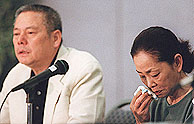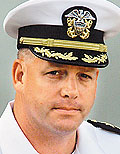 Admirals try to reconcile crew, collision Admirals try to reconcile crew, collision
 Immunity requests may alter inquiry Immunity requests may alter inquiry
 Navy told of chances to raise Ehime Maru from ocean floor Navy told of chances to raise Ehime Maru from ocean floor
 Investigator urges improvements in subs' ability to rescue Investigator urges improvements in subs' ability to rescue
 A Tribute to the Missing A Tribute to the Missing
 Previous stories Previous stories
 See KHON-TV video of families' reaction to Waddle apology, available in low and high bandwidth format. RealPlayer is required. See KHON-TV video of families' reaction to Waddle apology, available in low and high bandwidth format. RealPlayer is required.
By Tanya Bricking
Advertiser Staff Writer
Ever since Cmdr. Scott Waddle’s submarine sank the fishing vessel that claimed nine of their loved ones, Japanese families have been waiting for an apology.
 |
| Kazuo Nakata, father of Ehime Maru victim Jun Nakata, addresses a news conference at the Japanese Cultural Center as his wife, Mikie, wipes away tears. The Nakatas and other family members of the nine people who died when the fishing boat was struck by the USS Greeneville held a news conference yesterday to describe a personal apology delivered by the sub's skipper, Cmdr. Scott Waddle.
Eugene Tanner • The Honolulu Advertiser |
It mattered little that President Bush uttered the words or that Lt. Cmdr. Gerald Pfeifer of the USS Greeneville turned to families attending his naval court of inquiry hearing this week and said, "I feel sorry for your losses."
Japanese families of those lost at sea wanted a sincere apology from the man in charge of the submarine himself.
When it came from Waddle yesterday, in a tearful encounter nearly a month since the Feb. 9 sinking of the Ehime Maru, it became more than one man saying he was sorry.
It was a turning point for grieving families beginning to understand the ways of an unfamiliar culture.
After three days of silence, Waddle approached the families before the start of yesterday’s 8 a.m. court of inquiry session and attempted to apologize to a few family members through an interpreter. In a private meeting after the court session, he met with all Japanese families attending the proceedings.
"All the time since the accident, hateful feelings kept me going," said Kazuo Nakata, whose son, Jun Nakata, 33, a teacher for Uwajima Fisheries High School, is among the missing. "But I met Waddle and talked to him in person today. Now I lost all my strength and I am blank."
Waddle’s tearful apology goes a long way toward calming Japanese anger toward him, said Ayako Doi, founder and editor of the Washington-based Japan Digest, an electronic summary of news from Japan, who spoke on National Public Radio this week about the culture of apology.
 |
| Cmdr. Scott Waddle apologized to relatives of Ehime Maru victims in a private meeting after yesterday's court session. |
"Americans usually equate ‘apology’ with admission of guilt," she said last night. "Japanese don’t. Something terrible happens and somebody bows their head. They apologize in front of the camera."
It’s meaningful to Japanese people that the apology finally is coming directly from the man they consider responsible, said Doi, a former Tokyo correspondent for Newsweek and Washington correspondent for The Japan Times.
"I suppose it’s better late than never," she said. "People have talked about apologies from the president and the secretary of state, but those people are not responsible for the incident. They may be responsible for damage control. I guess the families really wanted to see for sure with their eyes the person responsible for this is in agony as well."
Mikie Nakata said she saw a different side of Waddle when she looked at him yesterday.
"I saw Waddle’s tears in his eyes," she said. "I told him that I’m taking my son’s picture to the court of inquiry every day. I asked him, ‘Please tell the truth.’ "
Ryosuke Terata, whose 17-year-old son, Yusuke, has been missing since the accident, said his feelings toward Waddle also changed.
"I’ve been eager to see Waddle," Terata said. "When I met him, I was very excited, so I spoke with an Uwajima accent: ‘Osoiyanaika! (which means, ‘it is very late’) You should have apologized earlier!’ in a strong tone. I heard that Waddle wanted to apologize earlier but was not able to do it because of different reasons. I felt sorry for him."
|
Court of inquiry's schedule today
 8 a.m.: Morning session convenes, testimony and cross examination of Capt. Thomas G. Kyle, N7, Commander Submarine Force, U.S. Pacific Fleet, resumes. 8 a.m.: Morning session convenes, testimony and cross examination of Capt. Thomas G. Kyle, N7, Commander Submarine Force, U.S. Pacific Fleet, resumes.
 1 p.m.: Afternoon session convenes, testimony and cross examinations to continue. 1 p.m.: Afternoon session convenes, testimony and cross examinations to continue.
 4:30 p.m.: Afternoon session adjorns until Monday morning. End-of-day review with question-and-answer period at Media Center, following adjournment of session. 4:30 p.m.: Afternoon session adjorns until Monday morning. End-of-day review with question-and-answer period at Media Center, following adjournment of session.
|
Before his naval inquiry began, Waddle asked officials at a meeting in the Japanese Consulate in Honolulu to pass on letters he had written to the family members. But the families said all they wanted was for him to tell them in person.
Being here has made them realize that Americans view an apology as an admission of guilt, and that Waddle’s silence might have been because of legal advice.
During yesterday’s court of inquiry session, which detailed the search-and-rescue effort of the Greeneville after the accident, family members got a glimpse of Waddle’s inner turmoil.
But it took his words, telling the families "all the responsibility rests with me" to put their minds at ease, at least a little.
"After I heard Waddle’s apology, my anger cooled down," Kazuo Nakata said. "Nothing about the court of inquiry and the future came to my mind. I realized that I have been living with hate ranked high."
Advertiser staff writer Susan Roth and translator Toshi Erikson contributed to this report.
[back to top] |


